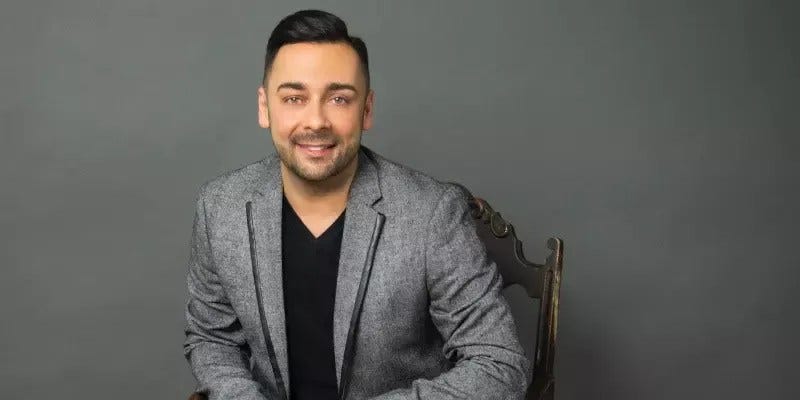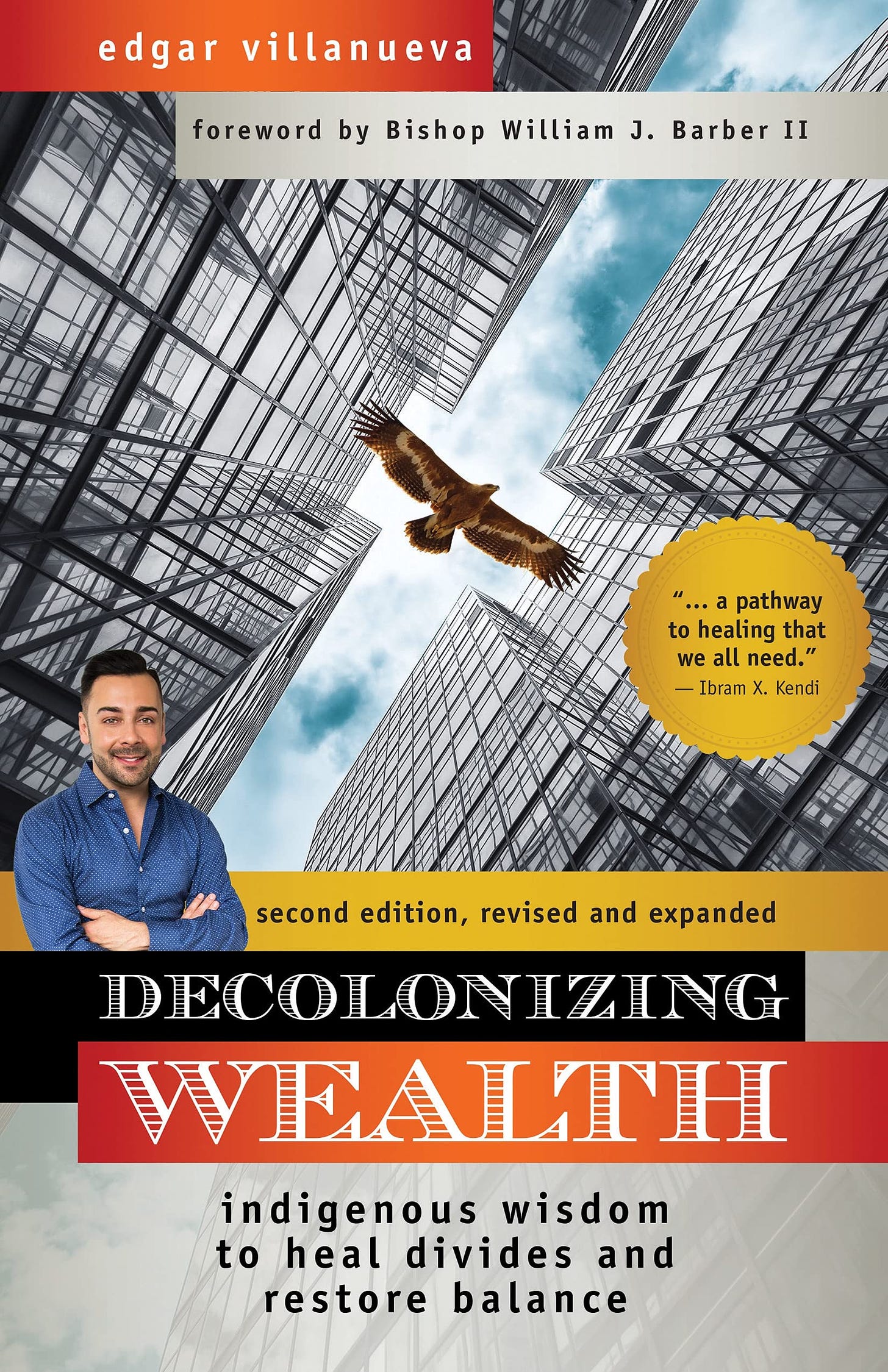We can get pretty twisted up about money and what it means about who we are and what we deserve. Just look at the headlines last week about our Congressional stalemate or even your own tense conversations with family members, partners, employers. Our confusion is deep and wide.
Edgar Villanueva, author of Decolonizing Wealth (which came out in a new edition recently), has a way of clearing the storm with sentences like this one: “Money is a tool to reflect the obligations people develop to each other as they interact.”
Wow.
If we proceed with that definition, we can imagine our way into entirely different ways of relating—to our past, to our present, and to our future. We can loosen our grip on earning and think more about honoring. We can release the “too much” of privilege—accrued over generations—and enjoy the lightness of that. And on the other side of such an exchange, we can accept what we are long owed as a tribute to our ancestors.
I have had the honor of interviewing Edgar a few times (the first was back in 2018) and always find him to be such a refreshing combination of fiercely honest, joyful, and pragmatic. What a combo, right? On this Indigenous People’s Day, Meet Edgar…
Courtney Martin: How would you describe the mind shift you’re trying to catalyze in philanthropy for those who are not necessarily familiar with the space?
Edgar Villanueva: I want people to understand and reframe the real history of wealth and their relationship with money. The wealth we see, not just in philanthropy, but broadly in the U.S., has been - for the most part - acquired through theft and extraction. The narrative we learn in school and through the media centers the history and story of white people in this country—their struggles and successes—them making something out of nothing. We are then sold the illusion of the “American Dream.”
The real story is that entire nations existed here when the first Europeans arrived. Cultures, music, and languages. But those ways of being were decimated and genocided for the sake of wealth. Our country removed and killed its Indigenous peoples and enslaved Africans to work that stolen land. Imagine the profit margin when you haven’t paid for land or labor. This history is the basis of the American economy. So it’s no surprise the U.S. quickly rose to be a wealthy country for white people. And while the methods of extraction and exploitation have evolved, the way capital moves through markets continues to be grounded in ideas of white supremacy.
The U.S. has never compensated the descendants of the removed Indigenous people or enslaved Africans for the life and opportunity that was lost—or for the resultant system that has demonized Black and Indigenous people and continues to contribute to our cycles of poverty today. It made us second-class citizens and intentionally made it difficult, if not impossible, to truly thrive.
When people learn the truth about our history, there is often an inclination to demonize money - but I speak in my book about how money itself isn’t evil; money is agnostic. It’s the love of money that gets us in trouble.
We have loved money more than our fellow humans.
In my journal, Money As Medicine, I invite people to imagine a different way of living and using money as a tool of love and restoration. We cannot fix what has happened, but we can use the wealth that is now available to right wrongs. This is why I call for reparations and why my organizations’ fund, Liberated Capital, launched the #Case4Reparations initiative this year—granting over $1.7 million to 23 BIPOC-led organizations doing advocacy and movement-building work for reparations in the U.S. Wealth redistribution through reparations is the only way we can close the racial wealth gap.
The revised and expanded second edition of your book is just out. This book has made such a big impact on the field of philanthropy and beyond. What is one of your favorite anecdotes for how it has changed the way a person or foundation or grantee acted in the world?
I have stories for days... and I share many in the 2nd edition of my book. The two I’ll share here are (1) the Bush Foundation announced a $100 million fund to give $50M to Black and Indigenous people in the midwest. My book, Decolonizing Wealth, was their inspiration, and I had the pleasure of working with them to structure the program to launch these new trust funds. What’s even more remarkable is that $100 million represents 10% of their corpus, meaning they took my call for philanthropy to give away or tithe 10% of their assets literally. I am still so blown away by this act of love and humility. They acknowledge the roots of their wealth, and this is their reparative act. It’s beautiful.
(2) More broadly, Decolonizing Wealth shifted the weather in philanthropy—the conversations have completely changed and what we once thought of as “radical” philanthropy is increasingly becoming modernized philanthropy. Racial equity is the centerpiece of virtually every philanthropic gathering. In many ways, I think our work at the Decolonizing Wealth Project set the table, and coupled with the powerful organizing of social movements like M4BL, we directly influenced the investment of hundreds of millions of new dollars for racial justice.
I’m inspired that the field has stepped up and that so much change has been possible in such a short time. We must be diligent though! As quickly as we are changing—there is resistance and “white lash” seeking to diminish this work and to regress to donor controlled and dominated philanthropy (vs. community).
2020 pushed us towards a more humane, spiritual way of doing this work—and for us at DWP, a deep grounding in healing. We’ve had nearly 200 funders to attend our Healing Summits—spaces where we literally provide healing ceremonies with ancestral healing practitioners. Reconnecting the work of philanthropy to heart and spirit, recognizing our own need to heal, has been transformative!
I always feel like the interactions I have about a book I publish on tour make me realize I could write a whole new book on the same topic. What has really shaped your thinking in a big way between the publication of the first edition and this new one?
The two new chapters in the second edition— “Medicine Beyond Money” and “Story As Medicine” —are the result of literally hundreds of conversations from my first book tour that I lovingly joke never ended. It didn’t seem to matter which city or country I was in; the underlying stories were the same: people wanted to know if they too could be healers. Few folks saw themselves already as healers, but as I describe in the chapters, we are all called to be healers in our unique ways. We all have something to share that can help someone else.
The first book focused a lot on the sector of philanthropy as a backdrop. It’s been clear that a movement around truth, reconciliation and healing is a framework that all sectors have embraced. The second edition speaks to some of those examples, including the corporate sector and the entertainment industry.
MacKenzie Scott, who has given away huge amounts of money with no strings attached to grassroots nonprofit organizations after divorcing Jeff Bezos, is really making waves. Are there any other foundations or initiatives or individuals that you think are good case studies for how to do philanthropy differently?
I love what BIPOC-led public foundations are doing. We’re funding the Black and brown folks who are on the ground doing the work, day in and day out, ultimately shifting the trajectory of this country. We saw this with the 2020 election, but it’s a tale as old as time. Black, brown, and other marginalized people have been at the source of crucial movements in this country without fail. Yet, they still struggle to receive adequate funding from traditional philanthropy; they still have to prove themselves worthy. So that’s where we step in.
Some of these funds have been around longer, and there are some newer ones, like mine, Liberated Capital. There is now a robust ecosystem of BIPOC-led public funds and we’ve proven to be critical partners to big philanthropy to do what it can’t. We have deep trust with communities and many of us come from the communities and movements we aim to support. We have the relationships, but until recently have lacked the capital.
This past year, I joined forces with others, including Vanessa Daniel of the Groundswell Fund, to write the Open Letter to Philanthropy. In this letter, we call for a significant transfer of resources into the control of BIPOC-led institutions that are primarily accountable to their communities. The more we receive, the better we can resource and redistribute to the folks we know are effectuating change at the local, state, and national levels. Philanthropy cannot act on its commitments to racial equity without us.
You have one of the best smiles and the most style of any social justice nerd that I follow on Instagram. How do you think about delight and pleasure in the midst of such serious work?
Well, first. OMG! That is so sweet, thank you. You know, we work hard and it’s been super heavy for the last 48 months…I experienced loss and several difficult transitions…my own writing about grieving became all too familiar. I said this at my 2nd edition book launch. I’m motivated by the healing that I’ve experienced and the healing that can take place for others. I’ve tasted freedom and it is yummy!
Yes, I’m still on my journey, but I am much freer than I was even five years ago. I haven’t always been this progressive activist person that people see today. I had to unlearn and commit to healing from a lot of oppressive thinking and ways that were imposed on me as a young person.
I have a personal goal of having at least one deep belly laugh each day. It’s true, laughter is medicine. I have a few friends I can always count on to give me a daily chuckle.
As for my style, it’s an art form, a creative expression. As I become more free, I’ve noticed more creativity and expression popping up in my wardrobe choices. Ultimately, I get it from my mother—she’s always been a super sharp dresser and taught me to put together a “look” and to snag a bargain!
We will be donating to Decolonizing Wealth in Edgar’s honor.






I find Edgar's invitation so provocative and attractive... Even as I wonder whether money can ever function as medicine in the liberated world we long for, or whether it's only a temporary bridge to get from here to there. Thank you for bringing his ideas to this space.
Some thoughts here putting Edgar in dialogue with others who are imagining a post capitalist world, for others who are also in this inquiry: https://citizenstout.substack.com/p/money-the-gift-economy-and-belonging